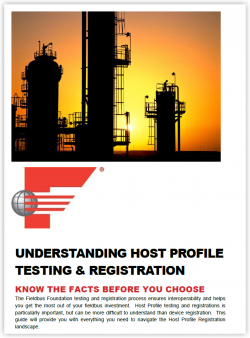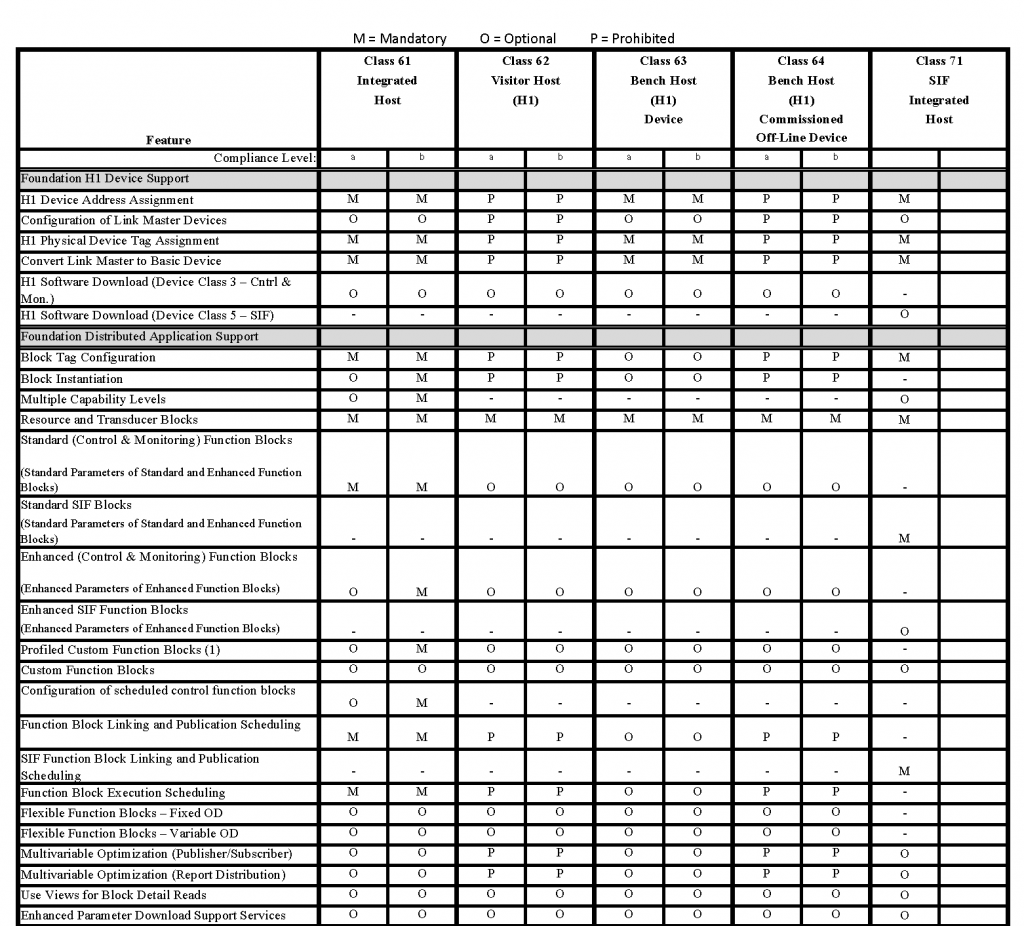Host Profile Testing & Registration Program
HOST TESTING PROVIDES THE BASIS FOR INTEROPERABILITY
Within the FOUNDATION Fieldbus automation infrastructure, interoperability is possible because devices and software must all conform to the same standard and they are tested and registered to that standard. Products bearing the FOUNDATION Fieldbus Product Registration symbol have undergone a series of common tests administered by FieldComm Group. End users can select the best device for a specific measurement or control task, regardless of the manufacturer.
Host registration provides an extra measure of confidence that fieldbus systems incorporate the robust functionality of FOUNDATION Fieldbus technology and are able to function as part of an open, interoperable control system. The host has been of particular concern in the past because it is the key element at the system level and can determine the success or failure of a fieldbus project. If your host is not registered and tested, you are taking some unnecessary chances and have no way of knowing if your host will work with a wide range of H1 and HSE devices from different suppliers.
HISTORY OF HOST TESTING
The FieldComm Group (and Fieldbus Foundation before becoming a part of FieldComm Group) has been doing host testing since its earliest days. Over the years, this process has evolved considerably. FieldComm Group's previous Host Interoperability Support Test (HIST) provided a host test protocol with no provision for formal product registration. With HIST, all the work was done by the host vendor. It soon became clear, however, that testing and registration of hosts was necessary. That’s when the Host Profile Registration Process was introduced.
Under the new Host Profile Registration Process, FieldComm Group conducts functional testing with a test device and specialized test Device Descriptions (DDs) and Capabilities Files (CFs). Registered devices from different vendors are also used during testing. The host profile under test must support a clear set of required features. A host will conform to some, or perhaps all, features as defined by the host feature checklist. However, because hosts can have various definitions, not all features may be applicable to a host implementation. Therefore, it is not expected that every host should support each feature.
Each feature contains a set of test procedures that are to be run against the host or the fieldbus system using the host. In order for a host to claim conformance to the feature, the host must be able to pass the test procedures defined by the feature. The features themselves are generic; therefore, manufactures will derive test cases, or actual implementation steps necessary to meet the requirements of the test procedure. Fieldbus hosts successfully completing the test requirements are authorized to bear the official FOUNDATION Product Registration symbol.
To view a complete list of registered FOUNDATION Fieldbus hosts, please visit our Product Registry.
HOST PROFILE REGISTRATION TECHNICAL PAPER

It is important to understand what host testing and registration means to the end user. The linked technical paper is specifically intended to help developers better understand the process.
HOST PROFILES & CLASSES
A host profile defines a minimum set of FOUNDATION-specific features that must be implemented by a host to achieve compliance to a specific host class. A host may incorporate one or more hardware and software components as defined by the host manufacturer. Currently, FOUNDATION Fieldbus has four profile classes defined. These include:
- Class 61 – Integrated Host: Primary, on-process host that manages the communication and application configuration of all devices on a network
- Class 62 – Visitor Host: Temporary, on-process host with limited access to device parameterization
- Class 63 – Bench Host: Primary, off-process host for configuration and setup of a non-commissioned device
- Class 64 – Bench Host: Primary, off-process host with limited access to device parameterization of an off-line, commissioned device
- Class 71 – SIF Integrated Host: Primary on-process host for Safety Instrumented Functions
Each of these host classes has its own set of characteristics, primary end users, and use cases. For detailed information about each of these, please see the DETAILS tab above.
Class 61 Integrated Host, primary characteristics are what you would normally associate with a DCS host. Integrated Hosts are an essential part of the process, and are online or “on process” hosts. Integrated Hosts set and manage Physical Device Tags for all devices as well as the network configuration. Integrated Hosts also manage the distributed application configuration, including the link schedule, backup link schedule, block instantiation, link objects, macrocycle, VCRs, and alerts. An Integrated Host provides full access to all resource block, transducer block, and function block parameters. It may maintain a backup/off-line database. The Integrated Host is widely used by many people throughout the plant. Process control engineers use the host system for configuration and analysis. Operators have access to the Integrated Host through operator workstations, while maintenance will use the host through plant asset management applications. Even management can use the host through other operations management and application workstations.
Class 62 Visitor Hosts are basic on-process hosts that may have read and write access to resource and transducer blocks. However, read-only access may be provided to function blocks. Visitor Hosts do not manage the physical device tags, network configuration or distributed application configuration. Visitor Hosts typically reside in handheld devices or PDA-like devices that are used for maintenance and have a temporary connection to the network. Visitor Hosts can also reside in specialized device applications such as online control valve diagnostic applications.
Class 63 Bench Hosts may set the network configuration for off process testing, but both Class 63 and 64 Hosts are off process hosts. They may also set a distributed application configuration, including link schedule, back link schedule, block instantiation, link objects, macrocycle, VCRs, and alerts. Class 63 Bench Hosts may also access all resource block, transducer block, and function block parameters. Primary users include maintenance and instrumentation personnel. Class 63 Bench Hosts are used for several applications, including testing of skid operations and setting up a new device for service. You may also use a Class 63 Bench host for maintenance of a previously configured and operating device that is removed from the process network or setup of a new device for device replacement service. If you have a used device that you want to reassign, you can use a Class 63 Bench Host to clear the device of any PD_Tag, H1 address, VCRs, LAS and function block schedules, link objects, and so on.
Class 64 Bench Hosts are primary off-process hosts for access to a prior commissioned device. A Class 64 Standard Bench Host has nearly identical requirement to a Class 62 Standard Visitor Host with the exception of device address configuration. Primary Users of Class 64 Bench Hosts would be instrumentation and maintenance personnel. The Class 64 Bench Host usually resides in a handheld or PDA-type device that is connected to an off-process segment or specialized device application such as offline valve diagnostics.
Class 71 SIF Integrated Host is the primary on-process SIF host for safety applications. Like the Integrated Host, the Class 71 SIF Host is a fixed H1 address, on-process host. It sets and manages physical device tags for all devices. It also sets and manages the network configuration and manages the distributed application configuration, and provides all the other functionality of the Class 61 Integrated Host. The difference is the additional SIF-specific functionality. Safety-specific functionality includes full access to all profiled SIF-related resource block and function block parameters. It supports the SIF protocol and maintains the SIF configuration signature, and can lock and unlock all SIF devices. As a safety system host, primary users are most likely plant safety engineers for configuration and analysis applications. Operators and plant management will also use the host during shutdown operations or for operations management purposes. Maintenance personnel will interface with the SIF Host for maintenance of SIF devices and process equipment.
Features of each Host Classification
Click the table below for a full breakdown of Mandatory, Optional and Prohibited features of each host classification.
